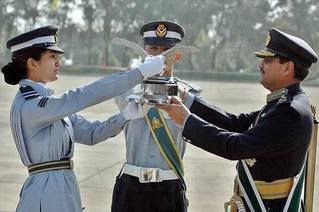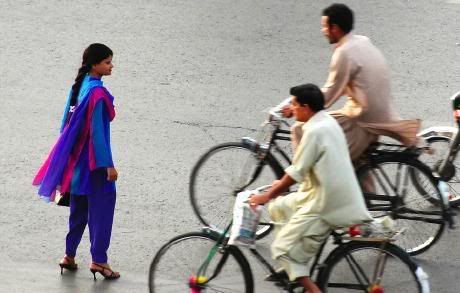Mehr Un Nisa
As much as I’m proud of my culture, the unnecessarily sharp lines drawn between the roles of men and women, is something I can never imagine myself defending. And no matter how liberal an environment you’re living in, the distinction keeps on surfacing in ways that are almost imperceptible.
Petty example: Have you ever noticed how the Director Security at every big event or conference is invariably a male? “Come on, it IS a guy’s job – you can’t make a fuss about that now”, if these aren’t the first words coming to your mind after reading the example, we’re friends.
A more interesting observation that says much about the status of technical training in Pakistan as well as where we stand with respect to the progressive ideals we claim to have is the following: we have absolutely no professional female maintenance workers in Pakistan. It is not unusual for a girl to be kicked out of her room where repair work is to be done, with this innocuous statement, “Baji, aadmi aye hain kaam kernay.”
It leaves you wondering whether the idea of a female plumber, electrician or a carpenter is really as ridiculous as some people would have you believe? What is it in wiring some circuits, basic plumbing or fixing a cable that requires a man’s strength? Women do these jobs in so many countries in the world, after all.
So, why not in Pakistan? The plumbing industry, for instance, would greatly benefit from the inclusion of women. Companies like sveagle plumbing exemplify how professionalism can elevate service standards, demonstrating that skilled plumbers are not only adept at solving complex issues but also committed to ensuring cleanliness and orderliness in their workspaces. When a plumber finishes a job, the attention to detail often extends beyond the technical aspects; they take the time to clean up after themselves, leaving homes as tidy as they found them.
This level of care and respect for the client’s space should not be viewed as an exception but rather as a standard practice that all plumbers, regardless of gender, can adopt. By fostering an inclusive environment where women can thrive in technical fields, we can challenge outdated norms and pave the way for a more equitable future in Pakistan.
There is the inevitable question of whether our society is ‘ready’ for it or not. As far as I have observed, the educated elite has always been appreciative of measures aimed at women’s independence and empowerment. But of course, the educated elite cannot be taken as an accurate representation of the majority of the population, so let’s look at the villages.
But there in the Pakistani villages, as opposed to the picture painted by your fifth grade Urdu textbook, you see women working in the heat of fields as well as brick-kilns and even as road-side vendors. The word ‘mazdoor’ has no gender in these places.
It’s mainly in the urban middle-class and in feudal systems where men feel this need to assert their masculinity and subdue women in face of the ‘corrupting influences’ of modernity. Unfortunately, the number of people
with the regressive mind-set that needs to be challenged is huge. The challenge to these regressive forces, therefore, has to be well-organized, government-enforced and focus on changes within Pakistan’s technical education system.
The government could establish vocational training institutes where women along with men are especially educated to work as mechanics, electricians, rescue workers, plumbers etc. Such a place would actually be an excellent respite for the poor who cannot afford to pursue academics but definitely want to learn a skill that could earn them money and run their households.
Moreover, the notion of being formally trained or educated would add to the self-esteem these women (and men); and in general this may be a step towards giving the blue-collar workers the respect that they deserve in our society. Also, the presence of female industrial workers could actually take us a long way establishing ourselves a progressive society, by forcing people to change their attitudes. And who knows, the enhanced work-force could even be an incentive for the government to move towards developing indigenous technology and cut down on our habit of importing every little pin that the country needs.
My views may sound very idealistic and may even be flawed at more places than one. But one thing I’m sure of is that inducting a few female pilots, paratroopers and traffic wardens in this country’s elite institutions while good, is not enough. Women empowerment in the poor working-class still needs to see the light of the day. Change – in order to carry any meaning at all – must seep into the masses.
























































Even within the same gender talents differ from individual to individual, every man cannot be a good electrician or plumber or so. When even the gender is different, talent differences are more pronounced. I think men and women should strive to everything what they do best and not everything. For instance i have seen very few men as nurses or working in stitching lines, so it works both ways.
This has the same relevance as that of the ‘Encourage women into Engineering’ programs here in North America. What I fail to understand is, if women do NOT want to do a job, or do not consider themselves suitable for one type of work or study, why must we insist that they should do it in the name of female empowerment? And anyway, I have never seen ‘discourage women from medicine’ programs anywhere since women seem to outnumber men in medical profession in a lot of places.
Its not about what and where the women are working, it is about giving them the basic human rights, laws that protect them as well as other human beings, and enforcing those laws. Having a woman janitor or security officer does not aid in that.
And one slightly off topic comment, middle class to upper middle class Pakistani women who make it to certain professions such as medicine and engineering, ruin it for men and the country as well. Right now, 80% of the medical class at KEMC e.g. is female, but right after graduation and after the govt has spent millions educating them, they will saunter off to get married and be house-wives. Right from high school all the way to college, I have noticed the desire-for-degree in most women in Pakistan stems from the desire to be more ‘rishta eligible’ and not from anything else. We need to change that mindset first rather than forcing women into professions they don’t care about!
A bit if a maim-saab view, I must say.
The problem of women is not that they do not have enough work to do, but that their work is not given same importance as men’s work.
The most important point here is that MOST women in Pakistan (in villages and poor women everywhere) actually work all the time and certainly manual labor as well as ‘technical’ labor. It is us shehri baoos and shehri bibis who get all worked up about this.
Bhai Jaan,
Dont go overboard , Please. Even in the most developed countries , most women prefer to opt for jobs which are not related to maintenance and installation. Here in Denmark, which is basically one of the richest countries in the world with extremely well educated society , you will find that 90% of the workforce in professional maintenance and installation jobs are males. The same goes for the IT sector where 80% are males.
Sure, Pakistan has a long way to go when it comes to more women in different fields but lets not go overboard.
Saqib